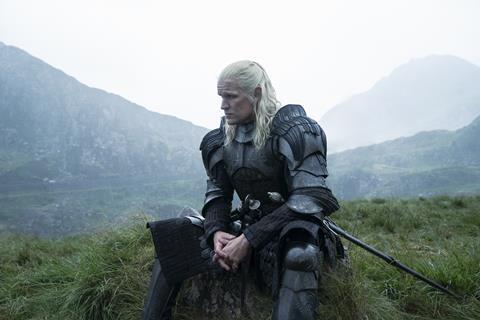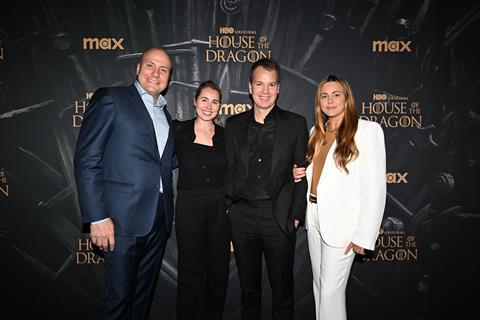Veteran programming exec Casey Bloys talks curation and quality control, his desire for international co-pros and how he’s never turned on a PlayStation.

“When we did The Last of Us, a lot of people asked me: did you want to do that because it was a video game?,” says Casey Bloys, chief executive of HBO. The answer, it turns out, was a resounding ‘No’: “I am not a video game player, I’ve never even seen a PlayStation, I don’t think I’ve ever turned one on.”
It might seem outlandish that a vastly experienced TV exec like Casey Bloys has little connection to one of the biggest media gadgets of all time, but it does offer a window into the HBO chief’s methods in approaching the premium brand’s programming slate.
The IP versus original ideas debate has dominated discussion in the scripted landscape for the last 18 months or more, but for the Warner Bros Discovery (WBD) veteran, the argument is too binary. HBO’s post-apocalyptic Emmy hopeful is a case in point. The Last of Us might take inspiration from the highly popular PlayStation game, but what piqued Bloys’ interest was Craig Mazin’s firm creative vision.
“That’s what I’m betting on, not that video game IP will draw people in,” Bloys says. “I’m aware there’s a fanbase for the game and people who love it, but sometimes that can be a double-edged sword.
“And there can be original ideas that don’t work, and there can be IP that is fantastic. I don’t think it has to be either or.”
The fact that hit HBO titles Mare of Easttown, Succession and White Lotus are based on original ideas is more a mark of working closely with the creatives to make their show, than a preference for this kind of content, Bloys says.
“The best thing you can do is get in business with people you trust,” he says. “It’s all risk- taking. And ultimately you bet on people and support them and hope it works out.”
Bloys is speaking to Broadcast in Paris, ahead of the European premiere of series two of tentpole Game of Thrones spin-off House of the Dragon, following a glitzy New York bash for the US launch. Bloys also oversees the content for WBD streamer Max which is launching in multiple international territories throughout this year and will need signature programming to compete with its entrenched rivals.
Intriguingly, he is not rigid in preferring quality over quantity, pointing out that the ‘peak TV’ era, underpinned by the shift to streaming, is here to stay “even if there’s a pull-back,” and audiences still have a “lot of great shows to watch and a wide variety” to choose from.
That said, the exec, who scaled the HBO ladder, having joined in a development role 20 years ago, notes he and his team have been judicious in their use of one of HBO’s most valuable pieces of IP - HOTD and upcoming fellow prequel A Knight Of The Seven Kingdoms: The Hedge Knight are the only two Game of Thrones spinoffs to emerge from WBD since it launched the streamer as HBO Max four years ago.
“In my mind, if you’re saying we need to have three Game of Thrones shows per year, you’re in the business of fulfilling an order, not making the best creative decisions,” he says.
The latter is the mantra by which he continues to oversee what is the pre-eminent, premium content brand in the market.

“We’ve tried to be fairly considered. Even now, when we’re doing a lot more shows than we did historically,” he adds. “And while doing that, we’re still trying to do shows with people we believe in, with concepts and scripts we believe in. We’ve never been at such an insane volume that there was no quality control at all.”
John Landgraf’s FX – which operates a similarly curated slate and spent over a decade putting together 2024’s breakout period epic Shōgun – is possibly HBO’s nearest peer in terms of strategy, an idea Bloys accepts. He says the similarities arise from the colleagues he and Landgraf have cultivated.
“He and his team have been together for a long time. Me and the creative heads I work with have all worked together for a long time. That’s a really big advantage, that trust and shorthand and [the mutual agreement over] taking your time to get something right,” he says.
“I could imagine Shōgun elsewhere and somebody saying ‘Fine, fine, let’s just get it on the air’ – you know? Instead, what FX got was something that will have value for decades and decades because it was done in such a high level.
“That is a very wise approach. It’s what we try to do as well. House the Dragon will be very worthwhile to Warner Bros Discovery this month, next year, ten years from now. It has a long-term value. Part of that is because you take your time, you try to get it right. If you’re rushing [it might affect the return].”
And Bloys says he will continue to spend big on shows like HOTD and The Last of Us because “the money is very well spent creatively but also on the return we get”.
HBO and Max development hats
Although his purview also spans Max, Bloys is clear that the two brands are distinct. At Max’s US launch last year WBD streaming chief JB Perrette pointedly noted that the streamer had dropped the ‘HBO’ from its name to relieve pressure on the cable brand and the streamer.
“We try to make sure that they’re doing different things,” Bloys explains. “If you left HBO in the brand of the platform and we’ve got all the content coming from Discovery, HBO then defines everything that’s coming on the platform.
“I would rather have HBO go back to what it was, which was defining a certain slate of dramas, comedies, documentaries and not have it be redefined by taking on a bunch of programming it wasn’t designed to take on.
“It’s tough because people have very strong feelings about HBO, which I appreciate. But it’s allowing HBO to stay HBO.”
His allusion to “very strong feelings” is an understatement. When Max launched former HBO chief exec Michael J. Fuchs didn’t mince his words when saying: “This is a 50-year-old company. I consider that it died at fifty. There’s no longer an HBO. Max made HBO become like Kleenex. It’s fucking crazy.”
Bloys is sanguine about the denunciation, reiterating that “everybody’s protective of the brand because of what we have done, what the teams before us have done”.
“HBO has consistently turned out shows that audience thought were worth paying for and care about,” he says. “It’s a legacy. I think maybe people who worked at HBO back in the day don’t understand the extent to which the cable bundle has come apart.
“There’s been a lot of decisions we’ve had to make – going into streaming. What we’re doing, I think, is ultimately protecting HBO.”
And he also says titles like DC origin story The Penguin or comedy Hacks are as much HBO show as they are Max shows – “a good show is a good show is a good show. And I’m happy to have them.”
International outlook
Some of the changes that have been made in getting Max to where it is now have included culling the international originals team which in the past helped bring about deals for shows such as Channel 4’s smash It’s A Sin and CBC Peabody-winning Sort Of.
“Before this latest merger you had HBO, then you had within Max an international team,” Bloys says. “Then you had the actual international teams. It was a layer on top of a layer.
“We didn’t operate in a co-ordinated way. What we’re trying to do is to be a lot more coordinated and cognisant of where we are spending our money and what we are spending it on in each region. We’re trying to have direct conversations with the regional, programmers.”
And despite many US buyers’ – particularly streamers – keenness to own shows totally, Bloys insists the international co-production tap will not be turned off for HBO and Max.
“We’re talking with BBC about various co-productions. It is still something we’re very interested in and I would say not only the creative talent, but the executives that we deal with at the BBC and with Sky. We have a lot of shared taste and interest in same writers and directors. I don’t see that changing.
“I know it is more difficult I think for some of the UK broadcasters to deal with streamers, [but] we’re still making deals with them. And, like I said, it’s been a very good creative collaboration. So, I would like to keep that going.”
With that, the conversation is over. But Bloys’ lingering message, and his overall demeanour, is positive – a rarity in these straitened times.
This story first appeared on Screen’s sister site Broadcast

























No comments yet